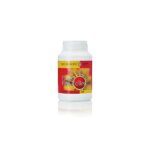




Bee Pollen 500mg Bee Health
£8.16 Original price was: £8.16.£6.49Current price is: £6.49.
Pollen
Bee Health pollen is a mixture of flower pollen, nectar, enzymes, honey, wax, and bee secretions collected by worker bees. It is collected from the stamens of flowers and is used by bees as a source of protein and other nutrients.
Bee pollen is sometimes referred to as “nature’s multivitamin” due to its rich nutritional content. Here are some key points about bee pollen:
1. **Nutritional Content:** Bee pollen is rich in nutrients, including proteins, vitamins, minerals, enzymes, amino acids, and antioxidants. It contains a diverse range of nutrients, making it a potential supplement for various nutritional needs.
2. **Protein Source:** Bee pollen is a source of complete protein, meaning it contains all essential amino acids that the body cannot produce on its own. It is particularly rich in certain amino acids, making it a valuable protein supplement.
3. **Vitamins and Minerals:** Bee pollen contains a variety of vitamins and minerals, including B-vitamins, vitamin C, vitamin E, calcium, magnesium, and potassium. These nutrients play essential roles in various bodily functions.
4. **Antioxidant Properties:** Bee pollen contains antioxidants, such as flavonoids and carotenoids, which help neutralize free radicals in the body. Antioxidants contribute to overall health by protecting cells from oxidative stress.
5. **Potential Anti-Inflammatory Effects:** Some studies suggest that bee pollen may have anti-inflammatory properties. It has been investigated for its potential to reduce inflammation and modulate the immune response.
6. **Allergies and Sensitivities:** While bee pollen is generally safe for most people, those with pollen allergies may experience allergic reactions.
It’s important for individuals with pollen allergies to exercise caution and consult with a healthcare professional before using bee pollen supplements.
7. **Energy and Stamina:** Some people use bee pollen as a natural energy booster. The combination of proteins, vitamins, and minerals may contribute to increased energy levels and improved stamina.
8. **Digestive Health:** Bee pollen contains enzymes that may support digestive health. These enzymes can assist in the breakdown of nutrients, promoting better absorption in the digestive system.
9. **Skin Health:** Bee pollen has been included in skincare products due to its potential benefits for skin health. It may help with skin rejuvenation and the promotion of a healthy complexion.
10. **Weight Management:** Some individuals use bee pollen as a dietary supplement for weight management. The protein content may contribute to a feeling of fullness, potentially reducing overall food intake.
It’s important to note that while bee pollen offers potential health benefits, individual responses can vary. Bee pollen supplements are available in various forms, including granules, capsules, and powders.
If you have pollen allergies or any concerns about using bee pollen as a supplement, it’s advisable to consult with a healthcare professional before incorporating it into your routine.
Additionally, pregnant or breastfeeding individuals and those with certain medical conditions should seek guidance from their healthcare provider before using bee pollen supplements.


















Reviews
There are no reviews yet.